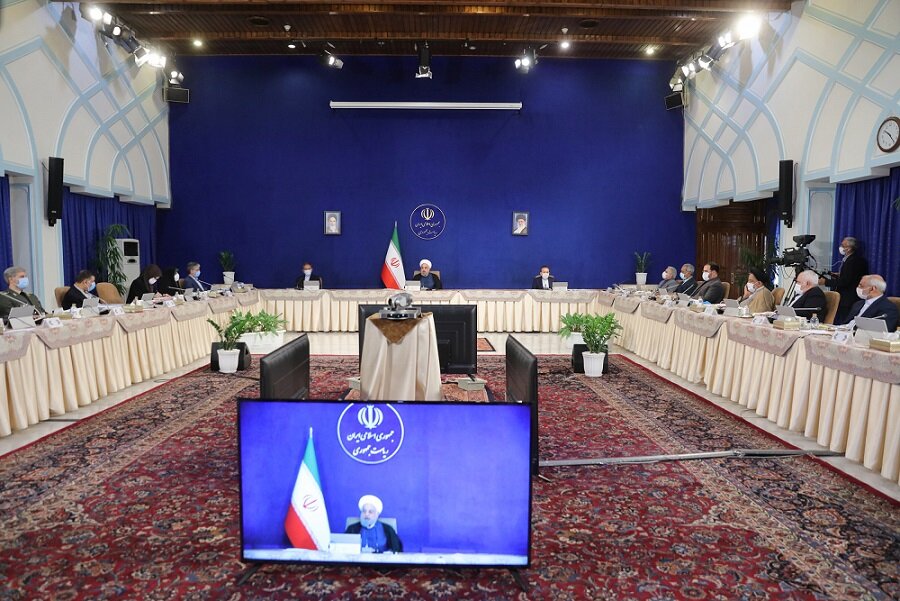U.S. seeks regime change in Iran, Rouhani says

TEHRAN – President Hassan Rouhani said on Wednesday that the U.S. is pursuing the policy of regime change in Iran but it failed to do so.
Speaking in a cabinet meeting, the president said, “When Saddam [Hussein] attacked Iran, he told reporters that, within few days, he will be making an interview with them in Ahwaz. In 2018, the Americans, while imposing an economic war [on Iran], also said they would be entering Tehran in few months and that these guys will not be able to celebrate the 40th anniversary of the victory of the Revolution.”
Rouhani was comparing Saddam’s war on Iran with the Trump administration’s policy of “maximum pressure” campaign against Iran.
On September 22, 1980, Saddam Hussein, the former Iraqi dictator, launched a massive war on the newly-established Islamic Republic that lasted until the summer of 1988. The war martyred hundreds of thousands of Iranian people. After eight years of fighting, Iran and Iraq reached an agreement to end the war. Every year in September, Iran commemorates the memory of war during a week called the “Sacred Defense Week,” which marks the beginning of the Iran-Iraq war.
Rouhani likened the Sacred Defense to the U.S. maximum pressure campaign against Iran. U.S. President Donald Trump announced the U.S. withdrawal from a 2015 nuclear deal between Iran and world powers on May 8, 2018, adopting a new policy against Iran aimed at forcing Iran into signing what Trump called a “better deal” instead of the existing one. To this end, the U.S. imposed sweeping economic sanctions on Iran. Last week, the U.S. turned up the heat on Iran by unilaterally announcing restoration of all previously terminated UN sanctions.
This year, Iran celebrated the Sacred Defense Week in the midst of diplomatic tensions with the United States. On September 19, the U.S. announced the return of UN sanctions on Iran.
“Today, the United States welcomes the return of virtually all previously terminated UN sanctions on the Islamic Republic of Iran…. Sanctions are being re-imposed on Iran pursuant to the snapback process under UN Security Council resolution (UNSCR) 2231,” U.S. Secretary of State Mike Pompeo said in a statement on September 19.
Rouhani said the U.S. is following Saddam’s lead in pursuing the policy of regime change in Iran and it even held talks with the Europeans about toppling the Islamic Republic.
“The U.S. asked the Europeans to give it only a three-month time span. Two European leaders told me that the U.S. told them that ‘if you refrain from helping them [Iran], the job will be done in three months given the economic pressures we have put on them’,” he said, according to the Islamic Republic of Iran Broadcasting (IRIB) news agency.
The president added, “Saddam’s goal was to topple the establishment, hurt the country or at least rip an agreement. The Americans wanted the same thing. They wanted to overthrow the establishment, create unrest, or destroy an agreement. But they failed to achieve their goals and their calculations were wrong.”
In 1980, Saddam tore apart the 1975 Algiers Agreement delineating the Iran-Iraq border and launched war against Iran on September 22, 1980. At the end Saddam failed to achieve any of its whims.
Rouhani also said the 2015 nuclear deal, which the Americans said they had destroyed, and UN Security Council Resolution 2231, have isolated the U.S. in the Security Council. “You saw that in an unprecedented event in history, 13 countries opposed the United States at the United Nations,” Rouhani boasted.
No countries, except for the Dominican Republic, have supported the U.S. measures at the UN, he added.
“Even the European countries, which are traditional U.S. allies, stood against the U.S.,” the president said.
SM/PA
Comments